
Objectively, the value of a half dollar is, well, half a dollar! However, if you find one of these coins in your collection, you may get a good price for it. Depending on their characteristics, mint marks, and errors, the 1943 half dollar value may increase significantly. You can definitely get returns on this investment that are far higher than the coins’ face value.
Let us have a more detailed look into these coins and the current 1943 half dollar value.
The 1943 half dollar, also known as the Walking Liberty Dollar, is a popular US currency known for its size and design. While these coins are no longer minted, they are sought after by collectors worldwide. As time passes, the 1943 half dollar value increases, mainly because of the coins’ decreasing availability. Such scarcity, high metal content, and historical significance make these coins valuable.
A 1943 half dollar’s diameter is 30 mm, while the coin weighs 12.5 grams. These measures have remained consistent in all Walking Liberty coins. These coins contain 90% silver and 10% copper. Their sides are equipped with grooves engraved at right angles to the faces. Adding these reeds has been a traditional way to prevent counterfeiting.
Designed by Adolf Weinman, the obverse of a 1943 half dollar showcases a full-figured image of Lady Liberty. She is walking (giving the coin series its name) against a rising sun located to her left. Wrapped in the Star-Spangled Banner, she can be seen holding an olive branch in her left hand.
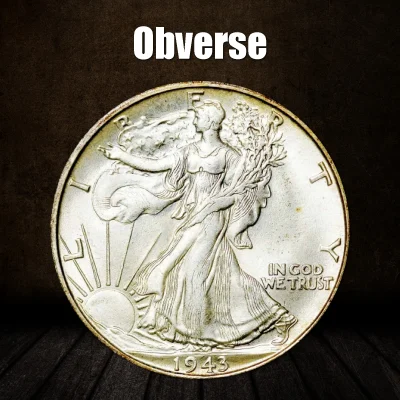
The Lady Liberty image covers almost the entire coin side, hardly leaving any blank space. Along the upper rim of the coin, you can see LIBERTY engraved. The motto of “IN GOD WE TRUST” can be seen behind Liberty’s right leg. The coin’s bottom shows the date of its mintage.
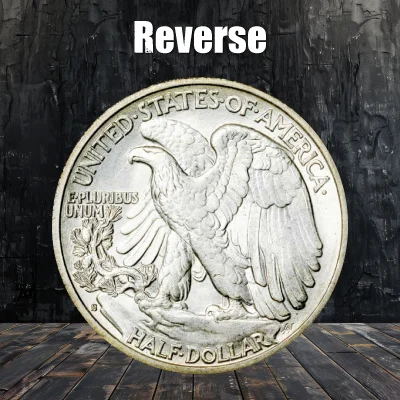
The coin’s reverse features a bald eagle at the center, with its wings raised. It is standing at a rocky outcrop’s edge. To the eagle’s left, you can see the motto E PLURIBUS UNUM. The country’s name features on the top of the 1943 half dollar’s reverse side. If present, the mint mark is engraved to the bottom left of the eagle.
The 1943 half dollar value mainly depends on where it was minted. These coins came from three major mints: the Philadelphia Mint (with no mint mark), the Denver Mint (with a “D” mint mark), and the San Francisco Mint (with an “S” mint mark).
Let us discuss the value these coins carry according to the NGS and PCGS grades.
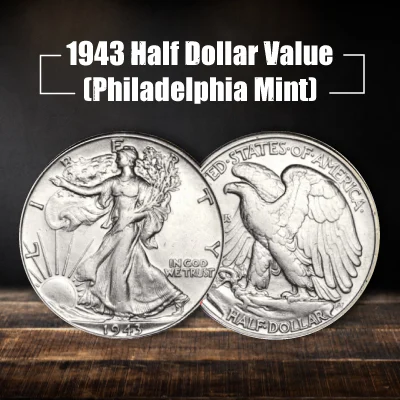
These are the no mint mark coins produced at the Philadelphia Mint. In 1943, this mint produced over 53,000,000 half dollars. Currently, the poorest quality 1943 half dollars are valued at $20 each. A coin graded MS 60 can fetch $70 in value.
A no mintmark coin of this series graded MS 67 can give you $700. Go half a point higher,r, and you can get $2,150. As of now, there are only 26 of these coins, each of which can give you $25,000. If you happen to stumble upon an MS 68+ coin of this series, it can give you a PCGS value of a whopping $125,000!
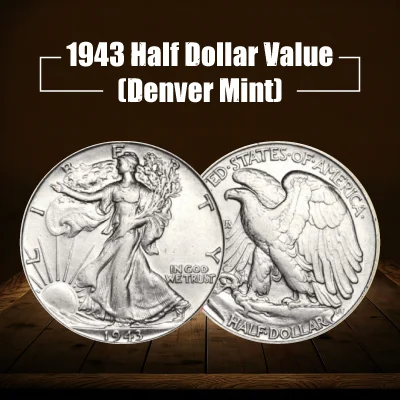
11,346,000 half dollars were struck by the Denver Mint in 1943. An MS 60 coin of this series carries a value of $70. A coin graded MS 65 can get you $190. So far, the highest value is attributed to six MS 68 coins, each of which is worth $37,500.
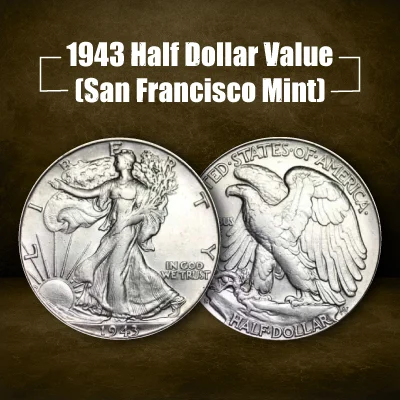
The San Francisco Mint produced around 13,500,000 half dollars in 1943. However, most of these coins’ quality suffered due to weak strikes. Coins of these series are particularly difficult to find carrying higher grades.
An “S” mint mark 1943 half dollar graded MS 65 is currently valued at $225. You can get $7,500 for a rare coin graded MS 67. The extremely rare MS 67+ coins of this series can fetch you $37,500 each.
If you are lucky, you can stumble upon a few exclusive 1943 half dollars coming from the San Francisco Mint. They are shinier, sleeker, and more aesthetic than the regular coins, making the coin grading services call them “proof-like.”
You can find these proof-like coins carrying grades ranging from MS 64 to MS 65+. While the coins at the lower end of this spectrum can fetch you $750, the ones at the higher end are valued at around $1,500.
The chart here summarizes the 1943 half dollar value for all major coins:
| Mint Mark | XF 45 | MS 60 | MS 65 | MS 67 |
|---|---|---|---|---|
| 1943 No Mint Mark Half Dollar | $40 | $70 | $165 | $700 |
| 1943 D Half Dollar | $40 | $70 | $190 | $700 |
| 1943 S Half Dollar | $40 | $70 | $225 Proof-like: $1,250 | $7,500 |
Generally, the 1943 half dollar value increases when the coin contains errors. Rarity and uniqueness can significantly make an otherwise normal coin immensely valuable.
Here are two major errors found in the 1943 half dollars:
These 1943 half dollars carry double die errors. They occur when there is movement when the die is struck with the hub. This creates a double image that is later transferred onto the coin. A coin, graded MS 65, carrying this error,r has been sold for $235.
This is another popular error where a 1943 S half dollar was struck on a plank made for a Peruvian half sol. Being an extremely rare error, it significantly increases the coin’s value. One such half dollar graded MS 63 was sold for $21,000.
It is always advisable to buy a graded 1943 half dollar to understand its durability and quality beforehand. The most reputed coin dealers and collectors rely on NGC and PCGS for grading their coins. These are two of the most reliable third-party coin grading services. They assign different grades to these coins depending on their finish, circulation, and overall quality.
While a coin graded “P” is in poor condition, the one graded MS (Mint State) is of high quality. These coins are also assigned numbers from 1 to 70, marking an increase in quality in the ascending order.
All it takes is a keen eye and basic coin knowledge to realize a 1943 half dollar value in your coin collection. If you are an avid coin collector or an investor willing to diversify your portfolio, you can purchase one or more of these beautifully designed coins. Carrying significant American symbols and the nation’s pride, these coins neither disappoint collectors nor investors!